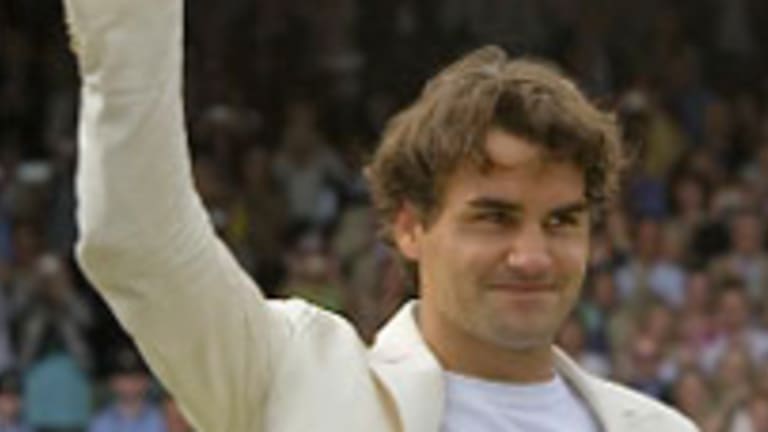Hi Steve,
You asked: do I think the book makes Federer seem like an interesting person?
Let's back up: Is Federer an interesting person?
I think so – he’s very much his own person, and that’s always interesting. As we discussed in the very first book club way back when, he’s managed to remain human, honest, curious, light-hearted and approachable despite winning all the time. And all that winning is done with a versatile and aesthetically-pleasing game, and without significant injuries despite so much play.
That alone is interesting: How does he do it?
Federer isn’t a ‘character’ in the way, say, Marat Safin is – why are those two always compared with each other? – but don’t you think he’d be one of the better players to do a tennis book club with?
In fact, one of the nice things about Federer is that he’s thoughtful and articulate enough to be able to say what he thinks without saying it in a sensationalistic way. But this can sometimes add a touch of blandness – after losing a match, Rog will say, yes, the loss is a pity and very disappointing, but he’ll probably get over it by next week. It doesn’t quite tug the heartstrings in the same way as Marat having a tough defeat and saying he’d like to jump off a building.
Both are honest answers in their own way, aren’t they? But what different mindsets.
On the harder issues, the Federer approach is usually more satisfying. Suspect gambling is the crisis topic this week, and here’s Federer on that: “Stuff does get out of the locker room sometimes. In this case, I think an investigation is good and I hope things go Nikolay's way. It could be more problematic in tennis than other sports, as the result of a match is in the player's hands. But tennis has really had few problems compared to the others."
Meanwhile, here’s Marat: “To be honest, I don't really care. Whatever people do and whatever they want to do, I don't care. If the world collapses, I don't really care. I have enough problems myself. I can't worry about other people's problems."
Maybe we’ll return to that when the Marat Safin story (Quest for Prozac) comes out, but for now, let's say that perhaps the things which make Federer interesting as a person make him less interesting as a celebrity. (Think, say, Natalie Portman versus Lindsay Lohan.)
Stauffer submits that one of the reasons Federer isn’t more of a star is his lack of outsize traits:
He doesn’t grab at his crotch like the street fighter Jimmy Connors and, at the time, was not considered to be a legend like Bjorn Borg, who looks like a Swedish god. He doesn’t dive over the court until his knees are bloody like Boris Becker, and also doesn’t surround himself with beautiful starlettes like some of his colleagues... Anybody who likes convertibles, safaris, playing cards with friends, good music and good food, sun, sand and sea, is too normal and unspectacular.
But there’s one very humanizing moment when Mirka discusses her own injury- interrupted career, which ended with a foot operation that left her housebound for eight months. “Roger was my greatest support back then. He gave my tennis life back to me. When he wins, it’s as if I win as well.”
Back to Federer the player for a moment. I liked your comparison to A Rage for Perfection, an explanation of John McEnroe that seeks to make his behaviour seem at least a little sympathetic. But while McEnroe always had that rage, Federer seems to have found success by coming to peace with it. Perhaps he decided that instead of chasing perfection, he would just let it come to him.
Stauffer neatly breaks down Federer’s evolution on pages 192-193: “Federer the tennis champion is a puzzle of many pieces. It took years for all the pieces to fit together. Everything fell into place with each moving part working in synchronicity – talent, athleticism, mental strength, self-confidence, ability to concentrate, tactical perception, professionalism, ambition and pride.”
There you have it – the ingredients of a champion. Do you think they need to go in any particular order, or is simply a question of acquiring them as they happen to come along?
Kamakshi
